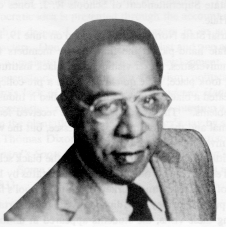 Alexander Murray
Palmer Haley, the oldest of three sons (George and Julius), was born to
Simon and Bertha (Palmer) Haley on August 11, 1921, in Ithaca, New York.
Six weeks after his birth, Simon and Bertha returned to Henning, Tennessee,
and presented Will and Cynthia Palmer with their grandson, Alex Haley.
Alex and his mother remained with the Palmers, while Simon returned to
Cornell University to complete his graduate studies in agriculture. After
the death of Will Palmer in 1926, Simon Haley joined his wife and family
in Henning and operated the Palmer business. In 1929, Simon Haley began
his teaching career, and the family moved. Two years after they relocated,
Bertha Haley died in Normal, Alabama.
Alexander Murray
Palmer Haley, the oldest of three sons (George and Julius), was born to
Simon and Bertha (Palmer) Haley on August 11, 1921, in Ithaca, New York.
Six weeks after his birth, Simon and Bertha returned to Henning, Tennessee,
and presented Will and Cynthia Palmer with their grandson, Alex Haley.
Alex and his mother remained with the Palmers, while Simon returned to
Cornell University to complete his graduate studies in agriculture. After
the death of Will Palmer in 1926, Simon Haley joined his wife and family
in Henning and operated the Palmer business. In 1929, Simon Haley began
his teaching career, and the family moved. Two years after they relocated,
Bertha Haley died in Normal, Alabama. At the age of fifteen, Alex Haley was graduated from high school. He attended college for two years, then in 1939 he enlisted in the United States Coast Guard as a messboy. While in the Coast Guard, he began writing short stories; it would be eight years later, however, before any of his stories were published. Approximately thirteen years after entering the Coast Guard, Haley became chief journalist. After twenty years of military service, Haley retired in 1959. Upon his retirement, he embarked upon a new career as a writer. He became an assignment writer for Reader's Digest magazine and later was associated with Playboy magazine, where he inaugurated the "Playboy Interviews" feature. Soon he was recognized for his insightful and in-depth interviews. His interviews of Malcolm X lead to his first book, The Autobiography of Malcolm X: As Told to Alex Haley (1965). Translated into eight languages, this literary work accorded Haley fame as an author.
The stories Haley heard as a youth in the 1920s and 1930s inspired him in 1964 to investigate his maternal ancestry. "Using the pronunciations of the African words repeated. . .by family members," Haley consulted "linguists at several universities." These linguistic specialists verified the language, as well as the village where the words originated. Haley conducted research in the Library of Congress and in Great Britain, where maritime records were available for slave ships. Traveling to the small village of Juffure, in Gambia, West Africa, he met the griot, who gave an oral account of seven previous generations in Mandinka tribal history, back to sixteen-year-old Kunta Kinte, who was wrested from the forest while searching for wood to make a drum. Haley's fact-finding mission verified the oral history preserved by his maternal ancestors.
For his trip back to the United States, Haley booked passage on a cargo ship to try to obtain first-hand knowledge of what his ancestor experienced during the three-month "Middle passage" to America. For ten nights, he slept on a "rough board between bales of raw rubber in the 'hold' of the ship." He tried to conceptualize what it was like to be shackled and lie in filth and human waste, while closely packed with more than a hundred other human beings.
Twelve years later, Haley's research culminated in the 1976 publication of Roots: Saga of An American Family. He called his literary work "faction," meaning that it was a fusion of fact and fiction. Prior to book publication, portions of Roots were condensed in Reader's Digest in 1974. As a result of the unprecedented popularity of Haley's book, the American Broadcasting Company (ABC) produced Roots, a twelve-hour televised miniseries based upon Haley's novel, in 1977. The series set records for the number of viewers and the Sunday night finale achieved the highest rating for a single television production. The Roots miniseries' audience surpassed the Civil War drama, Gone With the Wind, which previously had been the most-watched television broadcast. During the course of the eight-night telecast, Roots was viewed by more than 130 million viewers Two years later, in February of 1979, the ABC-Television network presented Haley's Roots: The Second Generation.
Roots in book form sold more than 1.6 million copies in the first six months after publication. The text was translated into thirty-seven languages and was serialized in the New York Post; the dramatic story stimulated interest in the study of Africa and in African American genealogy.
Alex Haley received the 1976 National Book Award for Roots. In 1977, Haley received the Pulitzer Prize, as well as the Spingarn Medal from the National Association for the Advancement of Colored. In 1989, Haley became the first person to receive an honorary degree from the Coast Guard Academy. The State of Tennessee honored Haley when it purchased and restored his boyhood home. Historically known as the Palmer House, the ten-room bungalow-style house is located in the small incorporated town of Henning, Tennessee, in Lauderdale County. The first state-owned historic site in West Tennessee and the first state-owned historic site devoted to African Americans in Tennessee, it was listed in the National Register of Historic Places on December 14, 1978. A state historical marker placed at the site tells of Haley's inspiration for Roots.
Alex Haley died on February 10, 1992. On February 15, after funeral services in Memphis, his body was conveyed to Henning and interred in the front grounds of the Alex Haley Boyhood Home.